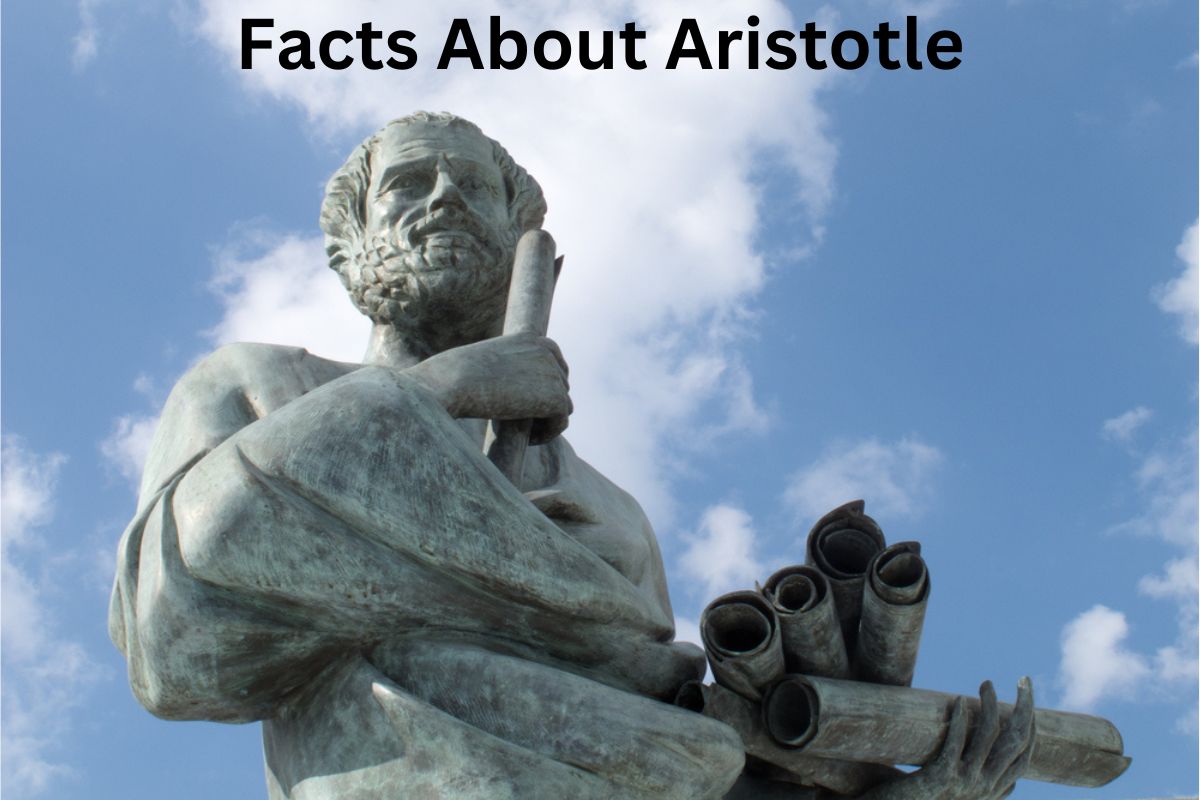Aristotle (384-322 BCE) was a Greek philosopher and scientist who is widely regarded as one of the most important figures in Western philosophy. Born in Stagira, Greece, he studied under Plato at the Academy in Athens before becoming a tutor to Alexander the Great.
Aristotle’s wide-ranging interests led him to make significant contributions to fields such as logic, biology, ethics, politics, and metaphysics. He developed a system of logic that laid the foundations for formal logic, explored the natural world through extensive studies of animals, and proposed the geocentric model of the universe.
Aristotle’s ethical theories emphasized the cultivation of virtues for a fulfilled life, while his political writings analyzed different forms of government.
Despite some of his views being influenced by the time he lived in, Aristotle’s works continue to be studied and have had a lasting impact on philosophy, science, and intellectual discourse.
Aristotle Facts
1. Aristotle (384-322 BCE) was a Greek philosopher and scientist
Aristotle studied under the renowned philosopher Plato at Plato’s Academy in Athens. He joined the Academy at the age of 17 and remained there for about 20 years until Plato’s death.
Also Read: Aristotle Accomplishments
During his time at the Academy, Aristotle immersed himself in philosophy, engaging in debates and discussions with fellow students and philosophers. While influenced by Plato, Aristotle also developed his own unique philosophical approach.

2. He was born in the city of Stagira in northern Greece
Aristotle (384-322 BCE) was a Greek philosopher and scientist who is considered one of the most influential figures in Western philosophy. He was born in the city of Stagira, which was located in the region of Thrace in northern Greece.
Also Read: Aristotle Timeline
His father, Nicomachus, was the court physician to the Macedonian king Amyntas II. Aristotle’s interest in the natural world and philosophy developed at an early age, setting the stage for his later intellectual pursuits.
3. Aristotle was interested in a wide range of subjects
Aristotle’s wide-ranging intellectual curiosity led him to explore numerous disciplines. He was not only a philosopher but also a scientist, biologist, logician, and political theorist.
Aristotle’s scientific investigations covered subjects such as physics, biology, astronomy, and meteorology. He conducted empirical observations and collected data to develop his theories, making him one of the early pioneers of empirical research.
His interest in biology, in particular, led to extensive studies of animals and plants, culminating in his work “The History of Animals,” which cataloged and classified various species. His multidisciplinary approach allowed him to integrate knowledge from different fields into his philosophical and scientific inquiries.

4. He was a tutor to Alexander the Great
Aristotle had a significant impact on the life of Alexander the Great. When Alexander was a teenager, his father, King Philip II of Macedonia, appointed Aristotle as his personal tutor.
For three years, Aristotle educated Alexander in various subjects, including philosophy, literature, and politics.
This formative experience played a crucial role in shaping Alexander’s intellectual development and leadership skills. Aristotle’s teachings instilled in Alexander a love for Greek culture, philosophy, and the idea of a unified Hellenistic empire.
5. Aristotle’s work on logic laid the foundations for formal logic
Aristotle’s work on logic has had a lasting influence on the field. His treatise “Organon” laid the foundations for formal logic and became the cornerstone of Western logical thinking. In it, Aristotle introduced concepts such as syllogism, deduction, and the laws of thought.
He developed a system of reasoning that emphasized the validity of arguments based on evidence and logical consistency. Aristotle’s logical framework became the dominant approach to reasoning for centuries and provided a basis for the development of the scientific method.
6. His philosophical works covered various areas, including ethics and virtue theory
Ethics and virtue theory were central to Aristotle’s philosophical inquiries. He believed that the ultimate goal of human life was to achieve eudaimonia, often translated as “happiness” or “flourishing.”
According to Aristotle, eudaimonia could be attained through the cultivation of moral virtues and the practice of virtuous actions. He argued that virtues were the means to a fulfilling life, and he identified several key virtues such as courage, wisdom, temperance, and justice.
Aristotle’s ethical framework emphasized the importance of moral character and the pursuit of a virtuous life for personal and societal well-being.
7. Aristotle’s view of the universe was geocentric, meaning he believed that the Earth was the center of the cosmos
Aristotle’s cosmological views were geocentric, meaning he believed that the Earth was the stationary center of the universe. He proposed a concentric model of the cosmos, with celestial spheres and heavenly bodies arranged in a hierarchical order.
According to his cosmology, the Earth was surrounded by the spheres of the Moon, the planets, the fixed stars, and finally, the prime mover—the unmoved and eternal source of motion. Aristotle’s geocentric model held sway for centuries until it was eventually challenged by Copernicus and the heliocentric model in the 16th century.
Nonetheless, Aristotle’s work in cosmology paved the way for subsequent inquiries into the nature of the universe.
8. He made significant contributions to the fields of biology and zoology
Aristotle made significant contributions to the fields of biology and zoology. His work “The History of Animals” is considered one of the earliest systematic studies of the natural world.
In this work, Aristotle examined various aspects of animal life, including their behaviors, classifications, and anatomical features. He emphasized the importance of empirical observation and collected a vast amount of information on different species.
Although some of his observations were not always accurate, his systematic approach and attention to detail laid the groundwork for future scientific advancements in the field of biology.
9. Aristotle’s concept of the four causes—material, formal, efficient, and final—was a fundamental part of his metaphysics
One of Aristotle’s notable concepts is the theory of the four causes. According to Aristotle, every event or object has four causes that explain its existence and nature.
These causes are the material cause (the matter from which something is made), the formal cause (the defining structure or pattern), the efficient cause (the agent or force that brings about change), and the final cause (the ultimate purpose or goal).
This framework provided a comprehensive understanding of causality and influenced subsequent philosophical and scientific thinking.
10. He classified various branches of knowledge and established a system of organizing information
Aristotle’s classification system was a significant contribution to the organization of knowledge. He categorized different branches of knowledge into distinct disciplines, establishing a systematic approach to studying and understanding the world.
His works covered a wide range of subjects, including metaphysics, logic, ethics, politics, physics, biology, and more. This systematic division and organization of knowledge influenced later scholars and thinkers, providing a template for the organization of academic disciplines.
11. Aristotle’s works were preserved and studied during the Middle Ages
Despite the loss of some of his works, Aristotle’s writings had a profound impact during the Middle Ages. Many of his works were preserved and studied by Islamic and Christian scholars, who translated them into Arabic and Latin.
His ideas shaped medieval philosophy and theology, where Aristotelian thought became central to the intellectual discourse. This period, known as Scholasticism, saw scholars such as Thomas Aquinas integrating Aristotelian philosophy into Christian theology.
Aristotle’s works, particularly in logic and metaphysics, formed the foundation of academic inquiry and influenced the development of universities in the medieval period.
12. His work “Politics” explored different forms of government and argued for a mixed constitution
In his work “Politics,” Aristotle delved into the study of government and political systems. He analyzed different forms of government and their strengths and weaknesses.
Aristotle advocated for a mixed constitution, which combined elements of monarchy (rule by one), aristocracy (rule by a few), and democracy (rule by the people). He argued that a balanced and harmonious blend of these three forms would result in the most stable and just governance.
This concept of a mixed constitution influenced subsequent political thinkers and had a lasting impact on the development of political theory.
13. Aristotle’s views on women were reflective of the time in which he lived
Aristotle’s views on women were reflective of the societal norms and attitudes prevalent during his time.
He considered women to be inferior to men and believed that they should be subservient to their husbands and excluded from political participation. He argued that women were naturally suited to be ruled rather than to rule.
While these views may be seen as outdated and problematic by modern standards, it is important to recognize that they were not unique to Aristotle but were common in ancient Greek society.
14. Many of Aristotle’s works were lost over time
Many of Aristotle’s works have been lost over time. What remains are primarily compilations of lecture notes and treatises compiled by his students, such as “The Physics,” “Metaphysics,” and “Nicomachean Ethics.”
These texts were preserved and passed down through generations, contributing to Aristotle’s lasting influence. The surviving works, though not in their original form, continue to be studied and analyzed by scholars, providing insights into his philosophical and scientific ideas.
15. Despite some of his ideas being outdated by modern standards, Aristotle’s contributions to philosophy, science, and logic laid the groundwork for much of Western thought
Aristotle’s contributions to philosophy, science, and logic have had a profound and enduring impact on Western thought. Despite some of his ideas being outdated or subject to criticism, his work formed the basis for much of subsequent Western philosophy.
His logical framework influenced the development of formal logic and the scientific method, shaping the way we approach reasoning and investigation.
Aristotle’s ethical theories continue to inform discussions on virtue ethics and moral philosophy. His works have been studied, interpreted, and debated by scholars throughout history, making Aristotle one of the most influential figures in the intellectual tradition of the Western world.
